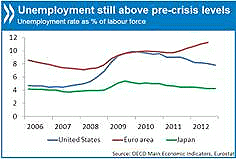Global economic activity is picking up, but the continuing crisis in the euro area is delaying a meaningful recovery, the OECD said in its latest Interim Economic Assessment.
The Assessment, presented in Paris by Chief Economist Pier Carlo Padoan, says that the G7 economies are expected to grow at an annualised 2.4% rate in the first quarter of 2013 and at a 1.8% in the second.
It notes that financial markets are out-pacing real activity, which has been held back by weak business and consumer confidence, and highlights the risk that asset prices may rise beyond levels justified by fundamentals.
“The global economy weakened in late 2012 but the outlook is now improving for OECD economies,” Padoan said. “Bold policy action remains necessary to ensure a more sustainable recovery, particularly in the euro area, where growth is uneven and remains slower than in other regions.”
The OECD projects that the euro area’s three largest economies – Germany, France and Italy – will grow as a group by 0.4% during the first quarter and by an additional 1% in the second, but points to a growing divergence between growth in Germany and the euro area economies.
The German economy is expected to grow by 2.3% in the first quarter and by 2.6% in the second. The French economy is expected to see a 0.6% contraction in the first quarter followed by a 0.5% rebound in the second. In Italy, real GDP is expected to drop by 1.6% in the first quarter and by an additional 1% in the second.
Weak growth and low confidence are expected to complicate efforts to bring down high unemployment rates across much of Europe“The employment situation continues to deteriorate in many countries, making it all the more urgent to implement the labour and product market reforms that can stimulate growth and create jobs,” Padoan said.
Growth in the United States was held back by one-off factors in the fourth quarter of 2012, but the economy is expected to see a rebound of 3.5% in the first quarter of 2013 before returning to moderate growth of 2.0% in the second. Canada is set to grow by 1.1% during the first quarter and 1.9% during the second.
Growth in Japan is projected to accelerate from previous low levels to a 3.2% pace during the first quarter and 2.2% in the second, while the United Kingdom is expected to grow by 0.5% during the first quarter and 1.4 % in the second.

Monetary stimulus remains necessary but needs vary across countries.
“In the United States, the commitment of the Federal Reserve to keep policy rates low until labour market outcomes improve substantially is well judged, but the need for further exceptional monetary measures is waning, while in Japan more aggressive policy action is required to escape deflation and achieve the Bank of Japan’s new 2% inflation target,” Padoan said.
“In the euro area, there is still some scope to ease monetary policy further, given weak demand and inflation well below the ECB’s objective, while further action is needed to repair the transmission mechanism. ”
We welcome your comments below. If you are not already registered, please register to comment
Remember we welcome robust, respectful and insightful debate. We don't welcome abusive or defamatory comments and will de-register those repeatedly making such comments. Our current comment policy is here.